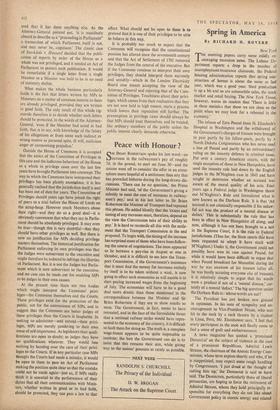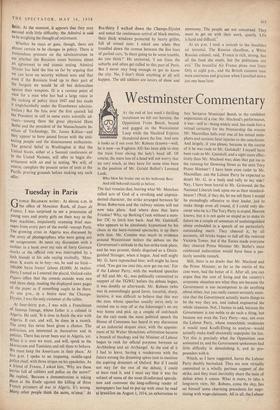Spring in America
By RICHARD H. ROVERE
THE morning papers carry some mildly en- couraging recession news. The Labour De- partment reports a drop in the number of unemployment-insurance claimants, the Federal housing administration reports that spring con- struction of homes is about the same as last year, which was a good year. Steel production is up a bit and so are automobile sales, the stock market and retail buying. The New York Times, however, warns its readers that `There is little in these statistics that show we are close to the point when we may look for a rebound in the economy.'
The release of Ezra Pound from St. Elizabeth's Hospital in Washington and the withdrawal of the Government's charges of treason were brought to pass partly by his fellow-poets, partly by a North Dakota Congressman who has never read a line,of Pound and partly by an extraordinary ruling on the insanity defence in criminal cases. For over a century American courts, with the single exception of those in New Hampshire, have used the insanity rule laid down by the English judges in the M'Naghten case in 1843 and have sought to determine whether an accused was aware of the moral quality of his acts. Four years ago a Federal judge in Washington threw out M'Naghten's Rule and formulated what is now known as the Durham Rule. It is that 'An accused is not criminally responsible if his unlaw- ful act was the product of a mental disease or defect.' This is substantially the rule that has been in effect in New Hampshire all along, and now, although it has not been brought to a test in the Supreme Court, it is the rule in Federal jurisdictions. (Thus far, the State courts thiat have been requested to adopt it have stuck with M'Naghten.) Under it, the Government could not possibly have won its case against Pound, for while it would have been difficult to argue that when Pound broadcast for Mussolini during the war he was unaware of his treason (after all, he was busily accusing everyone else of treason), it is relatively simple to argue that his words were a product if not of a 'mental disease,' cer- tainly of a mental 'defect.' The big question under the Durham Rule is : whose words are not?
The President has just broken new ground in optimism. In his note of sympathy and en- couragement to Vice-President Nixon, who was hit in the neck by a rock thrown by a student in Lima, Peru, Mr. Eisenhower says, 'I feel that every participant in the mob will finally come to feel a sense of guilt and embarrassment. . .
A news magazine has quoted a 'prominent Democrat' on the subject of violence in the case of a prominent Republican, Admiral Lewis Strauss, the chairman of the Atomic Energy Com- mission, whose term expires shortly and who, if he is reappointed, may expect some rough handling by Congressmen. 'I just drool at the thought of cutting him up,' the Democrat is said to have said. The Democrats, particularly those of liberal persuasion, are hoping to force the retirement of Admiral Strauss, whom they hold principally re- sponsible for everything they do not like about Government policy in atomic energy and related fields. At the moment, it appears that they may succeed with little difficulty; the Admiral is said to be weighing the thought of retirement.
Whether he stays or goes, though, there are almost certain to be changes in policy. There is tremendous pressure on the administration to see whether the Russians mean business about an agreement to end atomic testing. Admiral Strauss has held the line so far by arguing that We can have no security without tests and that even if the Russians lived up to their part of the bargain we would be all but defenceless against their weapons. (It is a curious point of view for a man who has had a large voice in the making of policy since 1947 and has made it singlehandedly under the Eisenhower adminis- tration.) But the fuss over the first sputnik led the President to call in some extra scientific ad- visers—among them the great physicist Hans Bethe and the president of the Massachusetts In- stitute of Technology, Dr. James Killian—and they appear to have joined forces with the anti, testing people and the disarmament enthusiasts. The general belief in Washington is that the United States, either at a Summit conference or in the United Nations, will offer to begin dis- armament with an end to testing. We will, of course, complete the present series of tests at the Pacific proving grounds before making any such offer.



































 Previous page
Previous page